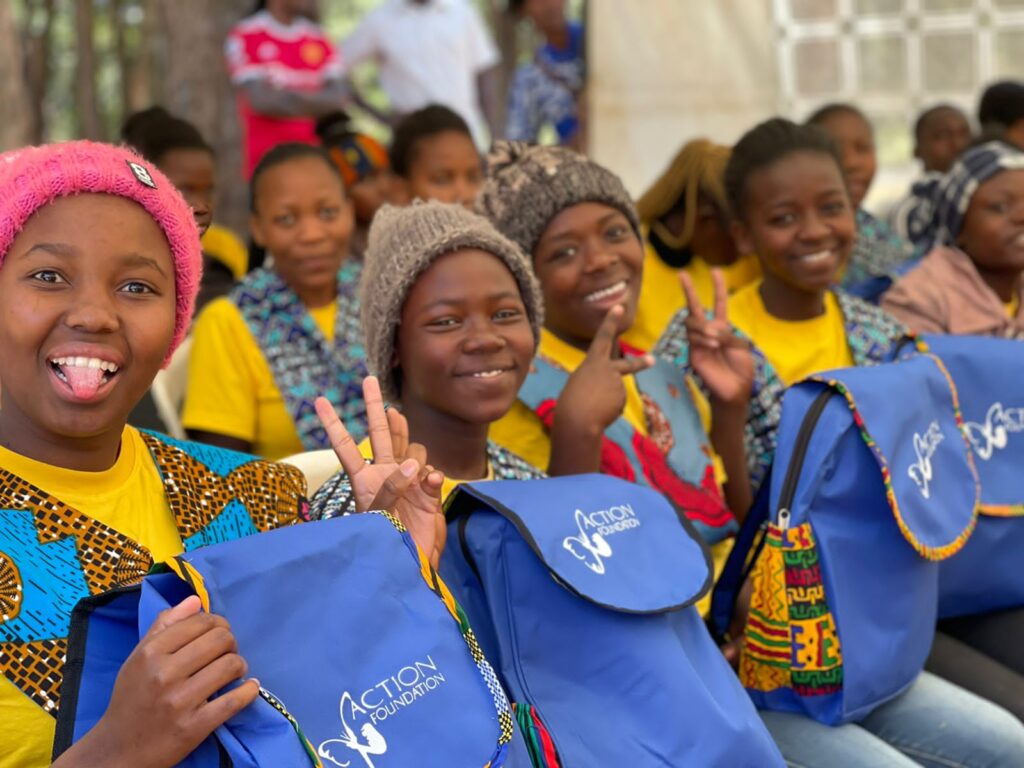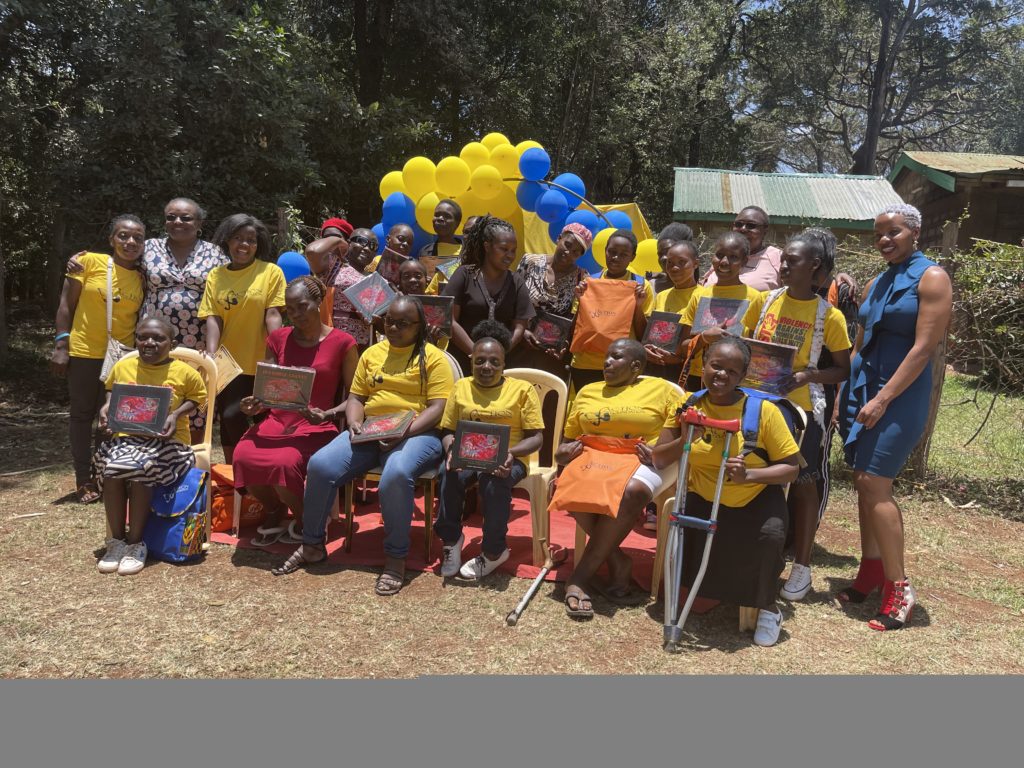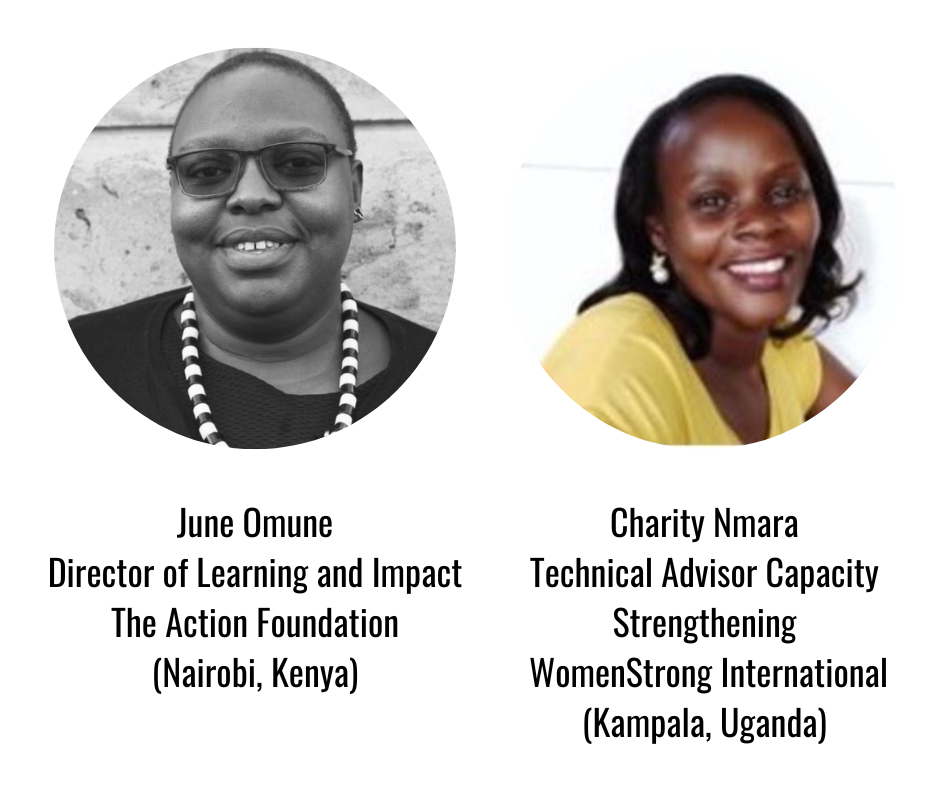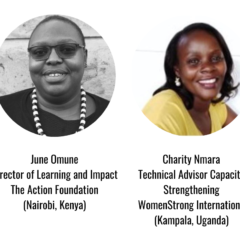Now Reading:
Walking the Talk: The Action Foundation’s Journey to Create Opportunities for Kenyan Girls and Women with Disabilities
January 23, 2023
Charity Namara:
In Africa, women and girls with disabilities carry multiple burdens of discrimination, hinging on their age, gender, and disability. In the Leave No Woman Behind – Situation of Women and Girls with Disabilities Africa report, published by the Global Call to Action, the authors highlight that, compared with men with disabilities, women on the Continent are…
- Three times more likely to have unmet needs for health care
- Three times more likely to be illiterate
- Two times less likely to be employed
- Two times less likely to use the internet.
In Kenya, where WomenStrong partner The Action Foundation was founded 12 years ago, girls and women with disabilities face the same virtually insurmountable vulnerabilities. Offering programming on inclusive education, nurturing care, and empowerment for women and girls with disabilities, the Foundation has grown from serving a small group of caregivers to assisting more than 9,000 clients across its program areas in the dozen years since its founding. To understand how it has successfully grown to serve so many people, I spoke with June Omune, Director of Learning and Impact at the Foundation.
Ms. Namara: How did you decide to serve girls and women, and how have you designed your programming?
June Omune:
As a women-led organization, it was an obvious choice for us to prioritize girls and women with disabilities, who have been marginalized because of gender and disability. There was an understanding that the success of these girls and women would be a win for everyone.
We developed a strategy that would help us learn from these women’s lived experiences. We conducted situational analyses, surveys to find girls’ and women’s levels of agency, and we created a safe space where they would be free to express their fears, aspirations, and strengths.
We also realized that, to make a sustainable change, we needed interventions to last long enough for our clients to see results.
The Foundation is now working with more than 240 girls and women with disabilities, most hailing from the informal urban settlements of Nairobi. These clients’ experiences are quite different, depending on where they live and their individual needs. While some face challenges that youngsters without disabilities may not, such as a lack of access to education due to inadequate or nonexistent accommodations for disabilities, or the need to travel long distances on roads too rough (with conditions tough even for those without disabilities) to navigate without accommodations, others have achieved great success despite the challenges.
Ms. Namara: How long do you work with each client?
Ms. Omune:
We believe in the importance of a lifecycle approach that addresses the challenges girls and women face at certain stages of their lives, from childhood to adolescence, to adulthood, to when they age. This approach accounts for the various barriers to opportunity and rights for women with disabilities at different stages in life. We focus on girls and women aged 8–45 years, because they experience more severe discrimination and marginalization because of the intersectional systems of domination based on gender, age, and disability.

We work with women and girls with disabilities across multiple initiatives: mentorship, education, violence prevention, economic empowerment, and digital skills acquisition. While there are similarities among our programs, each has on its own unique approach.
Ms. Namara: How do you help your clients gain self-confidence and agency?
Ms. Omune:
We mentor young girls on life skills to help them develop more self-confidence. One of the girls, Jane, who is 13, told me, “I would not have gained the confidence to speak in public and become a class prefect in my school if I had not come for mentorship sessions at The Action Foundation.”
Teaching and coaching a generation of girls with disabilities to have self-efficacy, to believe in themselves — and supporting them with skills to be the change in their communities — puts them in a position to take on positive roles in their communities.
Ms. Namara: How does The Action Foundation help to respond to and prevent violence?
Ms. Omune:
We’ve created a community of rights defenders by working with and alongside women and girls with disabilities to train, mentor, and advocate with the larger community on violence-prevention approaches and response mechanisms. The community can identify girls who are at risk and respond appropriately when violence occurs.
We’ve also held sessions on power; these have supported girls in identifying opportunities for themselves to establish their own power within the community.
For instance, Nicole, 19, is visually impaired and is part of a music group in her church, which champions the inclusion of girls with disabilities. She has used her music lessons to strengthen herself, navigating her role as a youth co-leader and dealing with subtle harassment and constant underappreciation of her abilities outside church. She asserts herself, and this has made her a role model in her church.
Ms. Namara: Please give us an example of how you catalyze professional opportunities for your clients.
Ms. Omune:
When we were first founded, we approached Prisca Akumu, a woman living with disabilities, to work at the Foundation; she said that she did not believe she was capable. Now 10 years later, she has become one of the most vital team members. We are grateful that she said yes!
One of the benefits of being in a vibrant women’s community like the one we have been able to create is sharing opportunities. We may not be able to solve every problem, but we use our networks of friends, allies, and peers to link our mentors and mentees to opportunities. These range from entrepreneurship and employment to skills-acquisition initiatives that provide women and girls a chance to practice the lessons gained during our sessions.
We offer stipends to girls who are enrolled in fashion design classes, while some girls and women with disabilities are gaining important digital skills to enhance their employability. Economic empowerment takes different routes, and it’s beneficial to engage on a case-by-case basis with the women, to gain the best results.

Ms. Namara: How do you get the word out about your work while also helping policymakers to understand the challenges faced by girls and women with disabilities?
Ms. Omune:
The Action Foundation has been using new digital spaces and platforms — from podcasts to social media (we are on YouTube, Facebook, and LinkedIn) to collaborative video-making — to help shape an inclusive agenda at all levels.
We have been bringing the voices of girls and women with disabilities into the policymaking process by speaking about girls’ experiences.
All these opportunities that we extend to the girls and women with disabilities were inspired by a profound reflection that Maria Omare, the Foundation’s Executive Director, has shared about the chances that have helped her in life:
“I am what I am because so many people took a chance on me,” Maria says. “I would not be where I am if they hadn’t believed in me. I have made the same resolve, coupled with my deep conviction, to grant the same opportunity to girls and women with disabilities. Our cascade model[1] of mentorship is based on the premise of women supporting women and paying it forward in areas where it matters the most.
“We are proud of what we have achieved so far. We are creating opportunities for girls and women with disabilities to be fully included in society. Our work aims to empower women with disabilities by providing them with the tools they need to make informed decisions about their lives and to take an active role in creating change — within their communities and beyond.”
Our appeal is to provide equal access to opportunities for girls and women with disabilities. They have the same potential. Just because they are differently abled does not mean they are less deserving of transformational opportunities. This why we collaborate with them at The Action Foundation.
[1] For the Action Foundation, the cascade model of mentorship is a format in which staff train older women with disabilities to be mentors. These trainees pass their life lessons along to younger women and girls with disabilities, who in turn share the wisdom with their peers within the community. The model fosters intergenerational mentorship and lifelong connections among mentors and mentees, enabling the sustainable growth of a movement toward inclusion for girls and women with disabilities.
Co-Authors

Charity Namara, Technical Advisor, Capacity Strengthening, WomenStrong International
June Omune, Director of Learning and Impact, The Action Foundation

